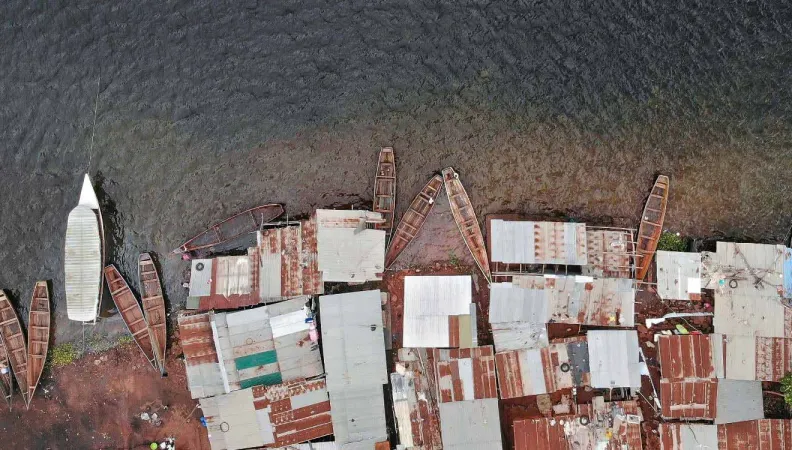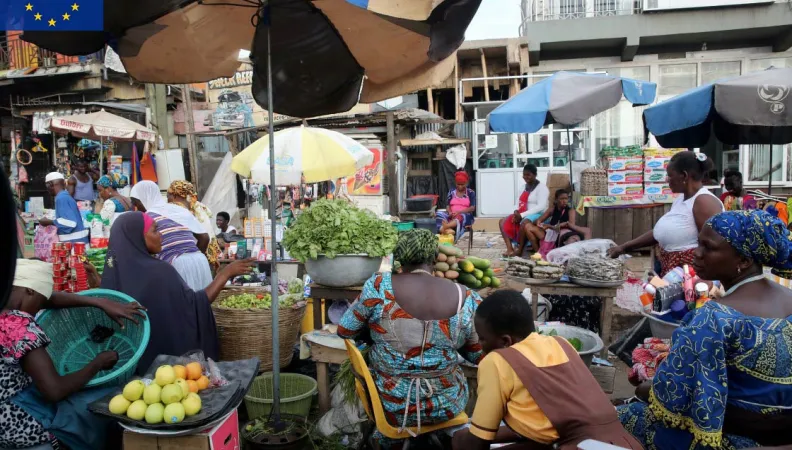 Legal notice EU (project) The CEQ Assessment is a tool that analyzes the impact of taxation and social spending on inequality and poverty, allowing governments to assess the redistributive and poverty-reduction impact of their fiscal policy.
Legal notice EU (project) The CEQ Assessment is a tool that analyzes the impact of taxation and social spending on inequality and poverty, allowing governments to assess the redistributive and poverty-reduction impact of their fiscal policy. In the first phase of the project (2018-2020), Agence Française de Développement (AFD) and the Global Development Network (GDN), in partnership with the Commitment to Equity (CEQ) Institute as well as local universities and local authorities, joined forces to implement the CEQ assessment in four African countries: Morocco, South Africa, Cameroon and Kenya.
In order to document its five-year planning process, Senegal requested the support of AFD and GDN to study the impact of fiscal and social reform scenarios. A second phase of the project, focusing on Senegal but also on methodological issues, is thus taking place over the 2023-2024 period.
Context
In the first phase of the project, Morocco, South Africa, Cameroon and Kenya were selected to participate in the research, analysis, and policy recommendations program, which significantly enhanced the evidence base for efficient and thoughtful redistributive fiscal policy that protects poor and vulnerable households from further impoverishment. Each of these countries learned from, and in some cases incorporated, the successful programmatic experiences from the others. The work program that the AFD-CEQ partnership encompasses also promoted skills sharing and capacity building between countries.
This project was part of the first phase of the Research Facility on Inequalities, coordinated by AFD and funded by the European Union over the 2017-2020 period. The first phase of the Facility has led to the conduct of 22 research projects and the publication of around 100 research papers and policy briefs.
Part of the second phase of this project focuses on Senegal, which is facing a number of important, sometimes contradictory challenges, likely to bring about lasting changes to the social contract and the redistribution of national income, such as:
- the development of gas and oil deposits (and the collection of the associated tax revenues),
- the implementation of a just energy transition partnership (JETP), which at the same time calls for the decarbonisation of growth,
- the desired extension of social protection schemes (health, retirement) to accompany a demographic transition that is still underway,
- the dismantling of energy subsidies to finance more infrastructure and develop better-targeted subsidies for poor households.
There is strong social demand for policies to reduce inequality, but this is taking place against a backdrop of regional instability, increased conflict, global inflation and global warming.
This analysis will be conducted in partnership with the Directorate General of Planning and Economic Policies of the Senegalese Ministry of Planning and the World Bank.
Objectives
The development of the CEQ Assessments, which are the centerpiece of the AFD-CEQ Institute partnership, accomplish two major objectives simultaneously:
- The implementation of CEQ Assessments builds an empirical evidence base (country by country) of the redistributive and poverty-reduction impact of fiscal policy broadly, as well as of individual fiscal elements (revenues or expenditures).
- The implementation of CEQ Assessments together with local research teams completes a knowledge and skill transfer to researchers and policy officers who will remain close to the ongoing policy debate and policy-making bodies who benefit from having this information at their disposal.
The AFD-CEQ Institute partnership therefore leaves in place the basic human infrastructure necessary for additional fiscal incidence analysis, including forward-looking policy simulation.
As part of the second phase of the project, the aim is for Senegal to master the CEQ tax incidence analysis tool and study a series of pro-poor reforms to reduce social and/or regional inequalities.
The expected deliverable is a report quantifying the impact of 5 areas of reform (cost, effects, financing).
Method
The CEQ Assessment is a comprehensive and rigorous tax and benefit incidence analysis which enables to have an active engagement with the policy community.It is designed to address the following four questions:
- How much income redistribution and poverty reduction are being accomplished through fiscal policy?
- How equalizing and pro-poor are specifics taxes and government spending?
- How effective are taxes and government spending in reducing inequality and poverty?
- What is the impact of fiscal reforms that change the size and/or progressivity of a particular tax or benefit?
In order to address these questions, experts from the CEQ working along with AFD researchers and local researchers teams implemented the CEQ methodology in Morocco, South Africa, Cameroon and Kenya, and will do so in Senegal.
Once done, the objective is to mainstream the use of CEQ Assessments:
- By reaching out to the policy community through partnerships and policy forums;
- By disseminating findings through an active communication and advocacy program, undertaken in conjunction with key partners in the research, philanthropic and social activist communities.
Results
You can find below the various publications related to this research project.
Fiscal incidence analysis reports:
- Fiscal incidence, inequality and poverty in Kenya: a CEQ assessment
- The impact of taxes and transfers on poverty and income distribution in South Africa 2014/2015
- Les effets de la politique budgétaire sur la pauvreté et les inégalités au Maroc (in French)
Policy briefs:
 Legal notice EU (project) Climate change and variability in South East Asia (SEA) has been remarkable in the past 20 years. The peculiarity of the economy and societal structure of SEA has an impact on how these effects will be distributed across the population. This project investigated the impact of climate variability on social inequality in Vietnam and Indonesia, with the purpose of informing and influencing policy dialogues and development around issues of climate variability and social inequality.
Legal notice EU (project) Climate change and variability in South East Asia (SEA) has been remarkable in the past 20 years. The peculiarity of the economy and societal structure of SEA has an impact on how these effects will be distributed across the population. This project investigated the impact of climate variability on social inequality in Vietnam and Indonesia, with the purpose of informing and influencing policy dialogues and development around issues of climate variability and social inequality.
Context
Climate change and variability in South East Asia (SEA) has been remarkable in the past 20 years. In this study we focus on Vietnam and Indonesia, two countries that are among the fastest growing lower-middle income countries in the region. They are also among the worst affected by climate extreme in the past decades, ranking 6th and 50th in the Climate Risk Index (2017), respectively. However, their poverty and inequality patterns and trends are remarkably different. Although reducing at a significant pace, poverty in Indonesia persists at much higher rate than in Vietnam (ADB, 2019).
Inequality patterns also differ and have specific country level peculiarities that makes each of these countries an interesting case study. A recent UNESCAP report suggests that, between 1990-2014, despite the similar economic growth, inequality has been increasing steadily in Vietnam and even more in Indonesia. Finally, inequality driving factors are also quite dissimilar, with ethnicity and remoteness, and rural-urban divide and migration, being predominant factors respectively in Vietnam and Indonesia.
This project is part of the first phase of the Research Facility on Inequalities, coordinated by AFD and funded by the European Commission over the 2017-2020 period. The first phase of the Facility has led to the conduct of 22 research projects and the publication of around 100 research papers and policy briefs.
Objective
The main purpose of this study will be two-fold:
- to provide policy makers with a substantial evidence base to target social equity and equality interventions effectively
- and to strategically inform the enforcement of social protection policies that are able to capture the climate-inequality nexus while maintaining a high degree of climate and poverty sensitivity and responsiveness.
The outputs of the project will be tailored to specific national priorities in terms of climate change and inequality via the direct engagement with policy makers and local experts. Advocacy, consultations and capacity building exercises carried out throughout the project will ensure that the research will address relevant evidence gaps to inform the dialogues for climate-inequality-sensitive decision making in Vietnam and Indonesia.
Method
Using a combination of repeated cross section analysis, panel analysis, synthetic panel analysis, we will investigate the relationship between climate variability and inequality at four levels:
- average impact – national level – entire population;
- average impact – national level – entire population by deciles of income distribution;
- impact at sub-national level – population located in hot-spots - vis-à-vis average/national impact (hot spots will be identified using the comprehensive climate data and the unit of analysis defined accordingly);
- impact at sub-national level – most vulnerable groups: ethnic minority, female headed HHs, etc.
Results
The outputs have been:
- One complete research article: Who bears the burden of climate variability? A comparative analysis of the impact of weather conditions on inequality in Vietnam and Indonesia?
- One policy brief in the AFD Policy Brief Series detailing the core contributions to the literature and results of the study: Climate variability and inequality: Comparing the experiences of Indonesia and Vietnam
- Two country policy briefs in the AFD Policy Brief Series detailing for each country the most salient aspects, results and recommendations forward:
- The impact of climate variability on inequality: Evidence from Indonesia
- The impact of climate variability on inequality: Evidence from Vietnam
Two webinars based on the research paper have been organised in the CGIAR Webinar Series. These two events sought to reflect on the impacts that the current climate crisis has on the most vulnerable in Vietnam and Indonesia and to answer the following questions: Is climate variability regressive? Or better does climate variability impacts more on those who are less able to cope with its consequences? And if so, what can we do to ensure an equal, sustainable economic development for all?
- Webinar on Vietnam: watch the replay here
- Webinar on Indonesia: watch the replay here
Contact
- Cecilia Poggi, Research Officer, AFD
- Dr Grazia Pacillo
 Legal notice EU (project) Led by the University of Ghana, this research project focuses on inequalities in Ghana, where they remain at important levels although this country has experienced rapid economic growth and significant reduction in poverty levels in recent times. Beyond a diagnostic study on inequality, this project analyses the changing dynamics in this country from a spatial, gender and ethnicity perspective. It also includes a focus on the relationship between economic inequalities and inequalities in education opportunities.
Legal notice EU (project) Led by the University of Ghana, this research project focuses on inequalities in Ghana, where they remain at important levels although this country has experienced rapid economic growth and significant reduction in poverty levels in recent times. Beyond a diagnostic study on inequality, this project analyses the changing dynamics in this country from a spatial, gender and ethnicity perspective. It also includes a focus on the relationship between economic inequalities and inequalities in education opportunities.
Contexte
Ghana has experienced rapid economic growth and significant reduction in poverty levels in recent times. However, the reduction in poverty has not translated into a reduction in inequality. Coloumbe and Wodon (2007), and also Cooke et al. (2016) recognise the spatial inequality that exists in the country, manifested particularly in the differences in income levels between the northern and southern parts of Ghana. Evidence by Oduro et al. (2011) and FAO (2012) also point to persistent gender inequalities relating to access to and control of assets as well as access to secured and less vulnerable employment.
According to Corak (2013), economic inequalities limit opportunities for economic and social advancement of the next generation as increased inequalities often alter the opportunities and the incentives for households to invest in the human capital development of their children.
This project is part of the first phase of the Research Facility on Inequalities, coordinated by AFD and funded by the European Commission's Directorate-General for International Partnerships over the 2017-2020 period. The first phase of the Facility has led to the conduct of 22 research projects and the publication of around 100 research papers and policy briefs.
Objectif
This project will draw on and consolidate this evidence-base and then fill some important, policy-relevant gaps that remain. By design, the research program outlined below seeks to address distributional issues in both the bottom half and the top of the distribution. The work program recognises from the outset that there are several dimensions of human development and wellbeing, and progress in some measures might be accompanied by deterioration in others. It recognises that economic growth does not necessarily lead to equitable outcomes – both poverty and inequality have self-reinforcing characteristics that are hard to counter.
Méthode
The research project will be developed across three work streams:
- The diagnostic study on inequality in Ghana will in essence aim to produce a report on inequality in Ghana. It will explore the census data and include an analysis of spatial inequality using the most recent poverty maps of Ghana. In view of this the team will be working with the Ghana Statistical Service to produce this report. This report will be based on a common framework to be developed by the hub of the ACEIR network.
- The researchers will take advantage of the two rounds of the Ghana Socioeconomic Panel Survey (GSPS) which are a result of collaboration between Yale University and ISSER. Using this data they intend to study how economic inequality has changed in Ghana over the period 2010 to 2014 (Wave 1 & 2 respectively) and what explains the changes. In particular, they will try to analyse the changing dynamics from a spatial, gender (of household head and at the individual levels) and ethnicity perspective.
- A paper on is the relationship between economic inequalities and inequalities in education opportunities in the context of Ghana. Even though enrolment rates in Ghana are generally very high, the inputs for good educational outcomes, such as the quality of school infrastructure, books and other educational materials are not equally available to pupils due to economic inequality. This in turn will have implications for educational outcomes and consequently future welfare status of these pupils as Mayer (2010) and Corak (2013) suggest. The researchers involved in this project hope to use this study to contribute to a better understanding of the nature and extent of this relationship. The study will use the two waves of the Ghana Socioeconomic Panel Survey (GSPS).
Results
Find the presentation of the research paper "Exploring the dynamics of micro- level consumption inequality in Ghana" by Nkechi Owoo (University of Ghana, ACEIR) during the sixth webinar of the Research Facility on Inequalities:
You may find the research papers and the Inequality Diagnostics here:
- Understanding the relationship between consumption inequality, inequality of opportunity and education outcomes in Ghana
- Exploring the dynamics of micro-level consumption inequality in Ghana
- Inequality Diagnostics for Ghana
Contact:
Anda David, Research Officer, AFD


